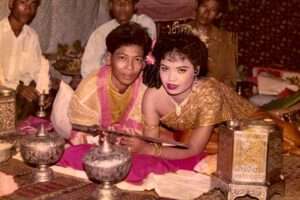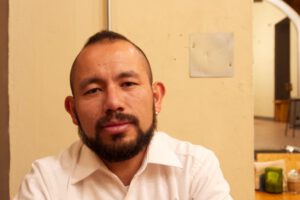J. Lester Feder
- 2013

Fellowship Title:
- How Gay Marriage is Changing the Globe
Fellowship Year:
- 2013

The Hidden History of Same-Sex Marriage in Asia
October, 2013 Muern Sarun’s parents had turned down several offers of marriage when they asked a motorbike mechanic named Rous Savy to take their daughter’s hand. Rous had taken a liking to Muern after she parked in front of his house in Cambodia’s Kandal Province on her way to weave scarves on a friend’s loom. Rous began visiting so often that the neighbors began to gossip: “Who would marry [Muern] if there is a man that goes to her house so often?” Rous quickly got the necessary permissions from the police and village chief, who granted the marriage certificate after Rous was able to reassure them that he would be able to support a family. Rous’ mother helped organize the wedding, which included blessings from four Buddhist monks. This would be a fairly typical story about a Cambodian marriage, except that Rous Savy was not born male. He had long dressed like a man and referred to himself in male terms, but he was what is known in Cambodia as a “tom.” Gender and

South Africa’s Same-Sex Marriages Don’t Always Have A Happy Ending
When the reigning Mr. Gay Namibia married his Botswanan partner in South Africa in April 2013, Zimbabwe’s ZimEye.org declared, “History [made] as Africa witnesses second gay wedding.” The first, said the website, happened a week earlier when two men married in a Zulu ceremony in the South African town of KwaDukuza. Of course, these were neither the first nor second same-sex weddings in Africa. Many couples have married in South Africa since the country legalized same-sex marriage in 2006. But because South Africa has sizeable white and Asian minorities, its same-sex marriages are dismissed by many opponents of LGBTI rights as a foreign import on a continent where 38 governments still criminalize homosexuality. (In South Africa and many other parts of the world, the preferred acronym is LGBTI—Lesbian, Gay, Bisexual, Trans, and Intersex.) These weddings may take place in Africa, but they are not “African” weddings. Mr. Gay Namibia, whose name is Ricardo Raymond Amunjera, and his husband, Marc Omphemetse Themba, have vivid memories of when South Africa passed its same-sex marriage law. So they

Latin America’s Gay Marriage Revolution
In his second inaugural address, U.S. President Barack Obama pledged to make the United States a beacon for the world by recommitting the country to its ideals of equality. He also made history by saying those ideals demand marriage rights for same-sex couples just as they have demanded equal citizenship for women and African Americans. But even if the Supreme Court or lawmakers soon agree with Obama’s words — “for if we are truly created equal, then surely the love we commit to one another must be equal as well” — the United States will be a latecomer to advancing marriage rights. The world’s leaders on this issue are not just from places Americans might expect — Western Europe or Canada — but many countries in our own hemisphere; places not usually known for progressivism on social issues. While Obama was undergoing his “evolution” on marriage rights, there has been a gay rights revolution that has stretched from Tierra del Fuego to the Rio Grande. One dramatic illustration: When a broad coalition of human-rights activists
